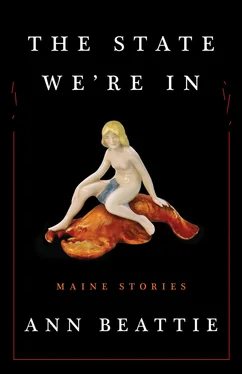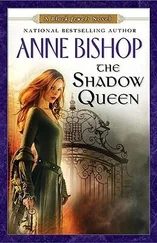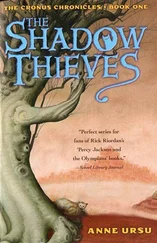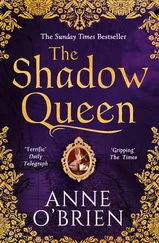She called Raleigh, as she’d promised she would, when she got the results from her blood test. It was late enough at night that Bettina wouldn’t even know she’d called. If she wanted real information about Jocelyn, her brother was a better bet than her sister-in-law, who didn’t really understand young girls and therefore projected even more negativity onto them than was there — if such a thing was possible. Raleigh had met Jocelyn’s teacher and pronounced her “very nice, quite intelligent.” That opinion could be relied on, more or less, factoring in that Raleigh rarely expressed doubts until after the fact, and that he liked young women. He’d been as mystified as the next guy by women when he was young and dating, but now he seemed to think the mere sight of one was as lovely as seeing the first robin of spring. As far as she knew, he’d never strayed in his marriage to Bettina, but who ever knew about such things when few birds and even fewer people mated for life. He picked up on the second ring. She could envision the blinking red button on the phone — an odd phone that flashed but never rang — so that of course he would not know someone was calling unless he was sitting in his study.
“Good news?” he said. The phone must also somehow indicate the caller’s identity.
“Inconclusive. I tested positive for antibodies to mono, so at some point I had it. It might have been a year ago when I thought I had flu. The test for Lyme came back okay, but something about it was borderline, and the doctor wants to repeat it in a couple of weeks. How’s my girl? How are you, for that matter?”
“I’d say she’s doing well. She’s bored here, of course, but I think it’s for the best. So would you say you’re feeling less tired?”
“I slept from one until four. That’s going to wreck my sleep tonight, but I was just so exhausted, I couldn’t stay awake. All I did today was take the car in for an oil change.”
He coughed softly, turning his head away from the phone. He said, “I came upon the key to Bettina’s diary. She was out, so I read a few pages.”
“She hid the key where you could find it?”
“In the bottom of the Excedrin bottle. Can you imagine? It was on a thin gold chain underneath the last of the pills. She must write in it when I go jogging.”
“How I envy you being physically fit. Not everybody who has a metal plate in his leg would go running at your age. How are Jocelyn’s essays? Does she put enough effort into them?”
“They seem to worry her a lot. She certainly doesn’t like writing them. I was that way, myself, back in school. I don’t think that young people like to be obliged to address subjects not of their own choosing.”
“How are we going to get her to pass algebra? That’s the big question.”
Raleigh had gotten straight As in high school. It was how he’d gotten into West Point. His former running buddy, who’d recently relocated to Phoenix for the warmer winters, had been his classmate. He missed their twice-weekly runs. Though he’d told no one, there was some possibility he might need an operation on his leg. He was the one who’d bought the big bottle of Excedrin. Bettina had taken most of the pills. “One thing at a time,” he said.
“What have you been doing other than being physically fit and being Jocelyn’s uncle? We’re all expected to be diverse in our interests and to give back. It’s like we’re all still trying to have a good résumé to get into college, whatever our age. Remember when I feigned interest in old ladies in nursing homes? Now I’m going to be one of them soon.”
“Today I contributed nothing to any good cause and listened to ‘Across the Universe.’ The Beatles.”
“I know who sang ‘Across the Universe.’ ”
Bettina was right; sometimes his sister did sound very much like Jocelyn. He said, “Jocelyn might like to know you called.”
“I’ll call her in a day or so, when I’m not so headachy.”
“Why should you have constant headaches? What do they say?”
“They don’t answer questions like that. They do blood work.”
“But I’d think that if you asked—”
“Ha!” she said. “You must have different experiences with those guys than I do. I suppose that’s true. They take men more seriously. That, and you can continue to have your delusions about good communication because you don’t ask questions of doctors or of anyone else, do you?”
“My training taught me to listen,” he said. “But don’t be ridiculous. Of course I ask questions.”
“So you’ll question Bettina about the diary?”
“No,” he said, snorting softly. “That isn’t at all likely.”
“You’ll secretly carry a grudge. That’s what she says about you, you know. That when you’re saying one thing, she can hear all the other things unsaid rolling around in your head like marbles, shooting off in all directions.”
“We get along,” he said, after a long pause.
Her tone softened. “I so much appreciate what you and Bettina are doing for Jocelyn. And I’m relieved that at least she’s doing the work. Maybe it will give her more self-confidence when school starts in September.”
“She’s made some friends. I think things are okay,” he said. He’d decided not to mention Jocelyn’s new bangs, cut jaggedly on a sharp diagonal, or the pink streak in her hair, which he understood to be temporary. Who knew what his own daughter Charlotte Octavia’s hair looked like, or whether she’d shaved her head? Her only overture in many months had been to send a pound of Kenyan coffee beans. It had been excellent coffee. About half the bag remained. He had suggested they store the remaining beans in the freezer, but she thought that unnecessary. In her diary, Bettina had called him prissy. How hugely insulting. It suggested, at least to him, homosexuality.
“I’ll call again soon,” Myrtis said. “I really am indebted.”
“Nonsense,” he said, as he hung up.
“Uncle Raleigh?”
He jumped. His eyes shot to the mirror hung beside the desk — the mirror whose border was patterned with little ducklings that had once hung in his daughter’s bedroom, where they now stored clothes out of season and where Bettina had set up a little area with a rocker, to read her cookbooks and to reread her beloved Edgar Allan Poe. One would certainly be a good antidote to the other, and Excedrin would not be required. Jocelyn stood in front of him in a voluminous T-shirt hanging over leggings (in July!). She was wearing socks over the tights and Hello Kitty slippers.
“Was that my mom?” she said.
“It was. Yes. Come in, Jocelyn. Sit down.”
“Did she ask if I was doing all my homework? Did you give her a good report?”
“It wasn’t a report, Jocelyn. We discussed the fact that you were working hard, yes. She’s going to call back soon. Still doesn’t have much energy. No one does, recovering from surgery.”
The way his niece settled herself in a chair, plunking down with absolute resignation, and without any thought of a moment’s pleasure, always surprised him. He suspected she came by his office so often to ask questions that were pointed and blunt, though perhaps not the issues that were most on her mind.
“Can you do me a favor, Uncle Raleigh?” she said. “Since you’re an adult, can you maybe call the hospital and find out if one of my friends is there?”
“Which friend?” he said. “Who is that?”
“T. G.’s father’s your friend, right? You didn’t hear?”
“Hear what?”
“Well, like, he tried to commit suicide.”
Charlotte Octavia had attempted to take her own life once. Twice, to be honest. Though they’d paid for psychiatrists, he’d never really understood why. He found the whole subject almost paralyzing. “Hank is my friend, yes,” he said. “I can’t believe T. G. would do a thing like that. It wasn’t Nathaniel, you’re sure?”
Читать дальше












